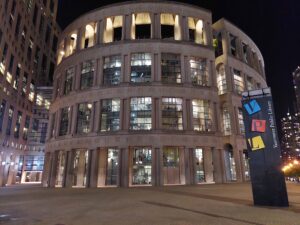To wrap up this series on Sustainable Community Development, here’s an overview of literature and practice. The full paper on this topic was published in the journal Sustainability in September 2020.
The origins of the concept of sustainable development can be traced to social and environmental justice discourses of the 18th and 19th centuries, while contemporary views are thought to have emerged following conferences and influential publications of the 1970s-1980s. SD gradually took its current shape after the 1987 Brundtland Commission report, the 2000 UN Millennium Development Goals, and the 2002 Johannesburg Summit, but became more widespread since the universal agreement on the UN SDGs in 2015. The SDGs offer an integrated vision and plan through at least 2030 and the full set is also applicable at the local level.
This research focuses on sustainability in cities which are often considered as a component of the problem and offer opportunities and solutions for both local and global system issues. Similarly to SD, urban sustainability seeks to integrate environmental, social, and economic considerations in complex urban development processes. It has been influenced by broader SD theories, such as ecological modernization, environmental justice, systemic thinking, and resilience, and locally relevant intellectual traditions and movements of the last two centuries, such as eco-localism, social ecology, self-reliance, bioregionalism, and native worldviews.
One of the major conceptual debates in SCD literature is the weaker-to-stronger sustainability spectrum between those who seek to change the supply side of resources and those who seek to change the demand side. Weak sustainability favors an anthropocentric worldview that dictates economic and resource efficiencies through technology and innovation to minimize environmental impact and enhance resource management. Strong sustainability argues that natural resources are finite and not always substitutable and therefore economic growth should not be an end in itself. SCD leans toward strong sustainability perspectives: preserving adequate amounts of natural assets, avoiding terminal damage to critical ones, and consciously seeking to address social issues through sustainable local development and self-reliance.
These theories and concepts are operationalized through a broad range of urban agendas, with that of the sustainable city being the most frequently occurring; others are: ecocity, smart city, resilient city, knowledge city, low-carbon city, ubiquitous city, green city, compact city, and livable city. A sustainable city can be broadly described as a complex and dynamic community that strives for intergenerational and intragenerational equity and optimized socio-economic benefits within ecosystem constraints.
As scholarly literature observes, weaknesses in urban sustainability result mostly from its application rather than from its meaning or definition. Many agendas lack interdisciplinary thinking or use climate action as a sustainability proxy while pursuing economic growth, leading to siloed implementation and sustained inequity. Urban sustainability plans are also often implemented within mainstream planning, investment, and operations and may be impaired by issues such as NIMBYism (“not in my back yard”), lack of sufficient resources and political will, community fragmentation, inter-city competition, technological efficiency interests, and climate change vulnerability.
Other obstacles to implementation include lack of stakeholder coordination, corruption in local politics, greenwashing or ‘cosmetic environmentalism’, and inadequate mandate and financing of local governments. In addition, collecting data has become an end in itself, but it is not clear if or how all this monitoring and reporting improves decision-making and encourages community change. Such issues can lead to lost opportunities, lack of credibility, and increased public scepticism.
Despite the debates and weaknesses, SCD could represent a new way of thinking about and planning for long-term development. The SDGs, the New Urban Agenda, the abundance of other urban agendas and networks, and the growing calls for climate action offer a window of opportunity for new methodological tools to help communities achieve their sustainability goals. In practice, SCD has in recent years started embracing initiatives in social, green, and circular economy, just and collective action, local resilience, and self-reliance.
Bibliography
Agyeman, J. (2008). Toward a “just” sustainability?Continuum,22(6), 751–756. https://doi.org/10.1080/10304310802452487
Cairns, S., Clarke, A., Zhou, Y., & Thivierge, V. (2015).Sustainability Alignment Manual: Using Market-Based Instruments to Accelerate Sustainability Progress at the Local Level. Sustainable Prosperity and University of Waterloo.
Connelly, S., Markey, S., & Roseland, M. (2013). We Know Enough: Achieving Action Through the Convergence of Sustainable Community Development and the Social Economy. InThe Economy of Green Cities(pp. 191–203). https://doi.org/10.1007/978-94-007-1969-9
De Flander, K. (2014). Operationalizing holistic urban concepts.Journal of Environmental Studies and Sciences,7(1), 141–144. https://doi.org/10.1007/s13412-014-0193-9
De Jong, M., Joss, S., Schraven, D., Zhan, C., & Weijnen, M. (2015). Sustainable-smart-resilient-low carbon-eco-knowledge cities; Making sense of a multitude of concepts promoting sustainable urbanization.Journal of Cleaner Production,109, 25–38. https://doi.org/10.1016/j.jclepro.2015.02.004
Dernbach, J. C., & Cheever, F. (2015). Sustainable development and its discontents.Transnational Environmental Law,4(2), 247–287. https://doi.org/10.1017/S2047102515000163
Elmqvist, T., Bai, X., Frantzeskaki, N., Griffith, C., Maddox, D., McPhearson, T., Parnell, S., Romero-Lankao, P., Simon, D., & Watkins, M. (2018).Urban Planet. Cambridge University Press. https://doi.org/10.1017/9781316647554
Folke, C. (2006). Resilience: The emergence of a perspective for social–ecological systems analyses.Global Environmental Change,16(3), 253–267. https://doi.org/10.1016/j.gloenvcha.2006.04.002
Garren, S. J., & Brinkmann, R. (2018). Sustainability Definitions, Historical Context, and Frameworks. In S. J. Garren & R. Brinkmann (Eds.),The Palgrave Handbook of Sustainability: Case Studies and Practical Solutions(pp. 1–18). Palgrave Macmillan. https://doi.org/10.1007/978-3-319-71389-2
Jackson, T., & Victor, P. (2011). Productivity and work in the ‘green economy.’Environmental Innovation and Societal Transitions,1(1), 101–108. https://doi.org/10.1016/j.eist.2011.04.005
Joss, S., Cowley, R., De Jong, M., Müller, B., Park, B. S., Rees, W. E., Roseland, M., & Rydin, Y. (2015).Tomorrow’s City Today: Prospects for standardising sustainable urban development.
Kaika, M. (2017). ‘Don’t call me resilient again!’: The New Urban Agenda as immunology … or … what happens when communities refuse to be vaccinated with ‘smart cities’ and indicators.Environment and Urbanization,29(1), 89–102. https://doi.org/10.1177/0956247816684763
Robinson, J. (2004). Squaring the circle? Some thoughts on the idea of sustainable development.Ecological Economics,48(4), 369–384. https://doi.org/10.1016/j.ecolecon.2003.10.017
Robinson, J., & Cole, R. J. (2015). Theoretical underpinnings of regenerative sustainability.Building Research and Information,43(2), 133–143. https://doi.org/10.1080/09613218.2014.979082
Roseland, M. (2000). Sustainable community development: Integrating environmental, economic, and social objectives.Progress in Planning,54(2), 73–132. https://doi.org/10.1016/S0305-9006(00)00003-9
Roseland, M. (2012).Toward Sustainable Communities: Solutions for Citizens and Their Governments(4th ed.). New Society Publishers.
Spiliotopoulou, M., & Roseland, M. (2020). Theories and concepts influencing sustainable community development: Introducing the concept of community productivity. In R. Phillips, E. Trevan, & P. Kraeger (Eds.),Research Handbook on Community Development. Edward Elgar Publishing.
Williams, C. C., & Millington, A. C. (2004). The Diverse and Contested Meanings of Sustainable Development.The Geographical Journal,170(2), 99–104. https://doi.org/10.2307/3451586

















